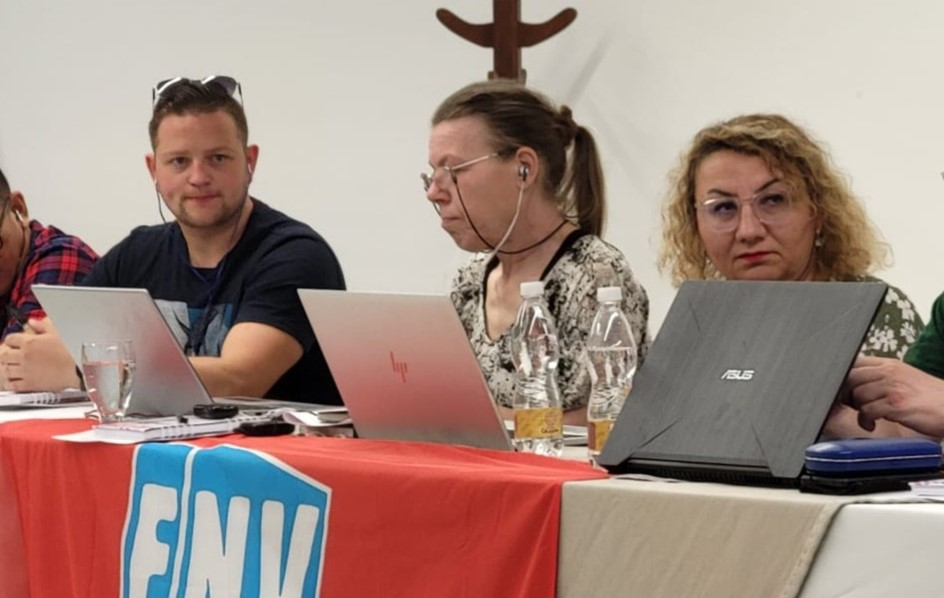FNV Handel urges the supermarket chain Lidl
to exert influence on the palm oil chain

What does Lidl have to do with palm oil? A lot! Indeed, 80 per cent of the products that enter our homes through supermarkets contain palm oil. Lidl is part of the German Schwarz Group, which is the third largest player in the supermarket sector worldwide. And now this multinational presents itself as sustainable and socially responsible.
We know that 1 + 1 = 2. Where a large multinational operates, there is also a lot of power. This is indeed why Fatma Bugdayci-Karatas, director of FNV Handel, and her cadres Carin Steenbergen and Geert Karel de Vries, are trying to put pressure on Lidl. As the supermarket buys so many products containing palm oil, it can exert influence on the chain and ultimately ensure better working conditions on palm oil plantations. "They decide what something may cost," Bugdayci explains, "so also what palm oil may cost."
Lidl profiles itself as a very green and sustainable supermarket, Bugdayci says. "We want to call them to account and also help them grow further in this. We want to involve Lidl in the palm oil project. We want to feed them our findings. We will focus at first on Lidl Nederland. Given Lidl's organizational structure in which things are strongly directed from Germany, we do not expect Lidl Nederland to comment. If so, we will follow up internationally and focus our sights on Lidl's headquarters in Germany. We will then work out the topic further with our international trade union colleagues who are active at Lidl and try to regulate things at the core (at the head office)."
According to Bugdayci, we are living in difficult times for workers and trade unions. "Society is moving further towards the right, so it is particularly important that people become aware of their position. Everyone is preoccupied with their own situation, but changes in the world call for international cooperation. Only then can we stand up to multinationals." Bugdayci refers to the new European Union (EU) rules on due diligence, which make internationally operating companies partly responsible for the chains they do business with. "It is a great opportunity to bring this up with Lidl," she says.
Last year Bugdayci and her cadres were asked by Mondiaal FNV to participate in the international campaign to clean up the palm oil sector. Since then, they have also been involved in the International Palm Oil Workers United (IPOWU) and attend the monthly online meetings with trade unions from the various countries.
In September last year, an IPOWU delegation went to Colombia. Carin Steenbergen and Geert Karel de Vries were there. "It was a very interesting exchange," says Lidl employee De Vries. "The Indonesians took note of the way work is organised in Colombia. In Indonesia much more pesticides are used, for example. I saw powerful trade unions and it was very interesting to see how the palm oil chain works." Steenbergen was also impressed. "The work is so tough, in the hot sun... So much happens on those plantations that you have no idea about."
De Vries likes to dedicate himself to workers on an international level. "I would like to leave something good behind," he explains. "Even at a small level: I like to inform people well on the shop floor. Lidl is a supermarket where we can only have influence up to a certain level. If we want more, we have to go international, because it is an international company. We want to move towards better agreements through that international path."
Fltr: Geert de Vries, Carin Steenbergen and Fatma Bugdayci-Karatas
Recently, De Vries was with an FNV delegation in Antwerp, Belgium, to discuss the international palm oil campaign with fellow union members of ACV Puls. "They were positive about our project. It would be nice if they joined in," he said. De Vries is convinced that if they "carry on planting small seeds" they will achieve long-term success.
Lidl employee Carin Steenbergen is also a motivated FNV cadre. She has been involved in international trade union work for over 10 years. "A Chilean trade union sent us a request for information about possible future changes in work/tasks in both the distribution centre and the supermarket in connection with automation. The union members there worked with mapping; they counted the number of actions they have to carry out, because they are paid per action. They used the information we provided in their collective bargaining. It was clear that the work would only get harder in future, so they negotiated better pay.
The FNV adopted this method, explains Steenbergen. "We commissioned research into pallets that were too high and too heavy, then advocated for lower pallets. Now we have agreed a maximum height with Lidl." Working internationally is self-evident for Steenbergen. "Lidl is part of a multinational and has many private brand factories, including in Hong Kong. If the company can put its own stamp on something, it’s definitely palm oil. Precisely because it is included in so many products. I assume Lidl is going to do what needs doing. And we at FNV are eager to help them in this."
Interviews: Astrid van Unen
